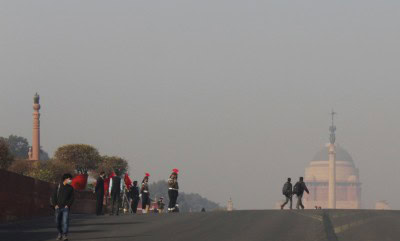New Delhi, Feb 20 : The India Meteorological Department (IMD) on Saturday said that dense to very dense fog will persist over the northern states of Delhi, Punjab, Haryana, Chandigarh, Uttar Pradesh and Rajasthan till February 21, adding that the intensity will reduce thereafter.
Fog engulfed the region and visibility was recorded at 500 meters or less in the morning. The visibility was 500 meters at Delhi’s Safdarjung area, Haryana’s Ganganagar and Ambala. It was 200 meters at Hisar in Haryana and 25 meters at Amritsar, Patiala and Palam.
“Improvement in Palam airport visibility, at 9 a.m. it is 50 meters. Visibility of runway 28 and 29 is only 200 meters. We expect flight delay and flight cancellation,” Mahesh Palawat, from private weather forecasting agency Skymet Weather in the morning.
Safdarjung weather monitoring stations, which provides representative data for the city, recorded a minimum of 10.4 degrees Celsius as against 9.6 on Friday. Palam station registered a minimum of 12 degrees Celsius. The mercury is on a gradual rise.
A fresh western disturbance is likely to affect Jammu and Kashmir, Ladakh, Gilgit, Baltistan and Muzaffarabad from Saturday onwards. Under its influence, light to moderate isolated to scattered rainfall and snowfall is likely.
Notably, another western disturbance, in quick succession, is likely to affect these western Himalayan regions from Monday. This will also bring scattered rainfall and snowfall with isolated thunderstorm, lightning and hail over the region.
A trough in low level easterlies is running from Southwest Bay of Bengal and Sri Lanka coast to north Tamil Nadu coast at 0.9 km above mean sea level. Under its influence, rainfall is likely over Karnataka, Tamil Nadu, Puducherry, Andhra Pradesh, Kerala.
As far as Air Quality Index (AQI) is concerned, it is currently in the poor category at 253 micrograms per cubic meter. Surface winds are low and forecast to improve significantly for the next three days.
“Improvement in ventilation and Air Quality Index is expected for the next three days. The Air Quality Index is likely to improve to the Poor category by tomorrow (Sunday) and likely to stay in Poor till 23rd February (Tuesday),” the Ministry of Earth Sciences said.
Ministry’s System of Air Quality and Weather Forecasting And Research (SAFAR) officials have advised sensitive groups to avoid physical outdoor activities. Other people have been advised to avoid prolonged exertion and keep windows closed.
“Stop any activity level if you experience any unusual coughing, chest discomfort, wheezing, breathing difficulty, or fatigue. Keep the room clean – do not vacuum. Masks known as N-95 or P-100 respirators may only help if you go out,” stated SAFAR.
Delhi’s neighbouring regions – Faridabad, Noida, and Gurugram also logged poor quality of air. The air quality of Ghaziabad and Greater Noida is, however, the worst at 340 and 317 micrograms per cubic meter.
Disclaimer: This story is auto-generated from IANS service.

